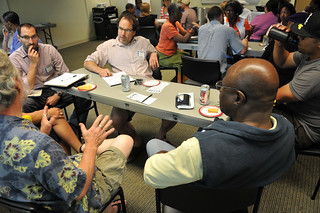
New research delves into the Williams
project process and why it turned into such a controversy.
(Photo © J. Maus/BikePortland)
It's been over two years now since the issue of racism and gentrification became part of PBOT's North Williams Avenue traffic safety project. As the public process for that project morphed into a citywide dialogue about these volatile topics, the project transcended PBOT and became a case study that has been investigated, analyzed, and debated by people all over the country.
Now the work of two Portland State University professors has been published in the peer-reviewed academic journal, Environmental Justice. The article, Contesting Sustainability: Bikes, Race, and Politics in Portlandia, (published in the August 2013 issue) was written by Dr. Amy Lubitow, an assistant professor in the Department of Sociology at Portland State University and Dr. Thaddeus Miller, an assistant professor at the Nohad A. Toulan School of Urban Studies and Planning, College of Urban and Public Affairs, at PSU.
"The environmental justice movement can, and should, seek to politicize sustainability in ways that will open up the concept of sustainability to the range of social and economic priorities that continue to impair the health and well-being of low-income and minority communities."
— From Contesting Sustainability: Bikes, Race, and Politics in Portlandia
Lubitow and Miller were present at many of the project's public meetings and they interviewed many citizens, city staff, and members of the project's stakeholder advisory committee.
Their article contends that the Williams project ended up being controversial because it was framed as having universal benefits and that city project managers and advocates failed to embrace the obvious political and racial elements that existed in the neighborhood where it would be built. Key to their argument is a characterization of the Williams project as a "sustainability" initiative and they leaned heavily on existing research about other "sustainability" efforts in gentrifying neighborhoods.
Here's more from the introduction:
"We contend that the inability of environmental justice concerns to gain traction in discussions about the design of sustainable infrastructure is due in part to the depoliticization of sustainability projects... that is, a given problem, project, practice, or policy is framed as urgent and necessary by appealing to universal values or scientific knowledge claims related to ecological health or public health and safety.
Sustainability, in other words, rises above what are perceived as parochial concerns and is too important to be dragged through the political mud."
Its this attempt at "sidestepping" issues like race and inequality that lead to controversy, according to Lubitow and Miller.
The City of Portland did extensive public outreach in the neighborhood at the very beginning of the project to ensure that the members of the stakeholder advisory committee reflected the neighborhood population. However, "Despite this extensive outreach," write Lubitow and Miller, "only four of the 22 members present [before the committee was enlarged] were people of color." They blame this disparity and the combination of "historical legacies of racism and inequality," in the North Williams area, as the, "catalyst for community grievances around this project to emerge."
The lesson from this project, according to the professors, is that projects like this should "encourage the politicization" of the plans from the outset and integrate "numerous voices" into the resulting changes that are considered.
Based on their research and observations, Lubitow and Miller conclude with the following argument:
"We suggest that the environmental justice movement can, and should, seek to politicize sustainability in ways that will open up the concept of sustainability to the range of social and economic priorities that continue to impair the health and well-being of low-income and minority communities... decision makers should assume that all community members have a unique vision for their local environment and that their input is a critical mechanism for truly sustainable outcomes—and for formulating a vision of sustainability that resonates with a broader set of constituents."
My quibbles with this article are that they couch this transportation project (which has its roots as a bikeway improvement project) as a "sustainability initiative" and the people who supported it as being part of the "environmental justice movement". I don't fully agree that a transportation project should be characterized like this simply because it includes a bicycling component. I also noticed they referenced a quote on BikePortland as coming from a "prominent blogger" when the quote they used actually came from a citizen at a public meeting (not from me, the author of the post).
These quibbles aside, their research and general conclusions are thoughtful and powerful. Read it for yourself online.

No comments:
Post a Comment